

Newsletter
December 2008 |
|
Awareness Travels the Globe on FASDay
|
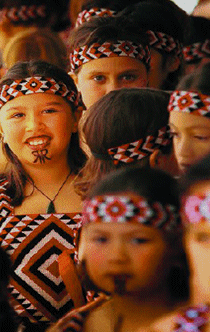
He HonoreHe honore, te kororia, Honour and glory to our great creator,
|
Once again, New Zealand had the distinction of being the first country in the world to celebrate FASD Awareness Day. The event was marked by the ringing of church bells throughout the country at 9:09 a.m. on September 9, and accompanied by a moment of silence. In a conference center on the outskirts of Auckland, a group of people from the New Zealand FASD community gathered to celebrate the day. The meeting was organized by the Fetal Alcohol Network of New Zealand (FANNZ) and Alcohol Healthwatch. The meeting included families, individuals with Fetal Alcohol Spectrum Disorder (FASD), professionals and other interested parties.
We were welcomed to the celebration by a group of children from a Maori language emersion school, which performed two welcoming songs or Waiata. Attendees were given pieces of rope in which they were invited to tie a square knot, to symbolize reconnecting the broken cord. We were also told "The Starfish Story" that emphasizes how we all have the ability to make a difference in the lives of people with FASD.
As part of this celebration, it was my great honor and privilege to be asked to conduct a three-hour seminar on FASD, describing the research that has been conducted over the years in the United States and stressing the need for similar research and interventions in New Zealand. Seminar participants discussed how families, caregivers and professionals can come together to help and support individuals with FASD. We also discussed how awareness of FASD can be raised on a local and national level, and ways to advocate for more services for people with FASD.
The event concluded with participants singing He Honore, a Waiata of peace and goodwill. The day’s festivities were quite moving and served to create a bond of determination to do whatever is in our power to help people with FASD. It shall have a lasting impact on me, and I suspect it will have a similar effect on all who participated.
Pregnant Men Pose in London’s Victoria Station
In the middle of the main concourse of London’s Victoria Station at 9 minutes past the 9th hour of the 9th day of the 9th month pregnant men and women stopped in their tracks and froze in the first PREGNANT PAUSE BIG FREEZE.
The pregnant crowd froze at 9:09 9/9/08 to tell the world that avoiding alcohol for only 9 months in pregnancy will insure that babies will be born without alcohol related brain damage known as Foetal Alcohol Spectrum Disorder (FASD).
Passersby were stunned to see pregnant men on the concourse. The reason for the event became clear when NOFAS-UK handed out leaflets explaining that when alcohol is consumed in pregnancy there is a risk that children may be born with lifelong FASD mental and physical disabilities.
It is estimated that 1 in 100 children are born with FASD in the United Kingdom (about 7,000 each year). More children are born with FASD than Down’s syndrome or spina bifida.
The first PREGNANT PAUSE was organized by NOFAS-UK on International FASD Day to raise awareness about the risk of drinking alcohol in pregnancy, especially binge drinking.
Susan Fleisher, the founder of NOFAS-UK and adoptive mother of a child with FASD, said this is just one of the events to educate and raise awareness about this growing problem. There are more children in schools with learning difficulties, ADHD, and social and behavioral problems, and it could be because their mothers were not told about the risks of drinking in pregnancy. Women may unknowingly harm their children. It is heartbreaking to watch a child struggle, especially when this disability could have been prevented. NOFAS-UK runs a helpline, school programs, conferences, training, support groups and publishes a newsletter to educate the public and to support families and children affected by FASD. The PREGNANT PAUSE gave people a chance to FREEZE for fun while raising the profile of the risks of drinking in pregnancy.
At the end of the 9 minute FREEZE in Victoria Station the crowd applauded and one man said, “I’m proud to be pregnant to help prevent FASD.”
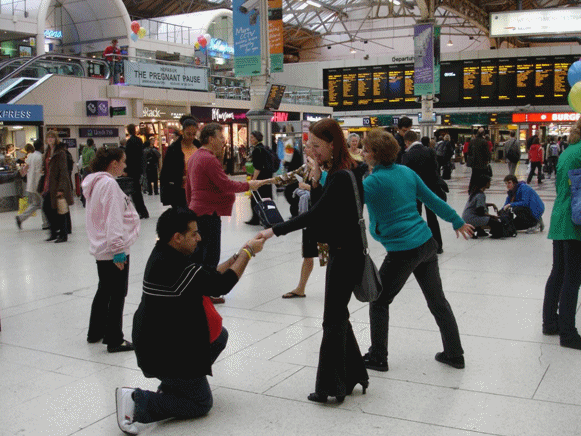
How Ireland marked International Fetal Alcohol Awareness Day 2008
Irish Members of the European Parliament (MEP) were involved in FASD awareness-raising events for the second year in a row. EUROCARE International Fetal Alcohol Spectrum Disorders Day 2008 was co-hosted at the European Parliament by MEP Mairead McGuinness from Ireland and MEP Cathy Stihler from the UK. Last year Avril Doyle hosted a EUROCARE event at the Parliament, where Dr. Kieran O'Malley was the keynote speaker.
These events have arisen from networking by FASD Ireland with EUROCARE over the last three years. FASD Ireland appreciates the energy and enthusiasm which EUROCARE has applied to raising awareness about the dangers of alcohol in pregnancy. Networking to get Fetal Alcohol Spectrum Disorders as an issue onto the general platform of alcohol concern has reaped many benefits.
The constant campaigning has been paying off, as Irish MEPs in particular have really been listening to the message, with Kathy Sinnott and Mary Lou McDonald attending this year's EUROCARE event, as did a representative of Jim Higgins, with Brian Crowley telephoning his apologies for not being able to attend, but pledging his support for the issue.
On the home front, shortly before Sept. 9th, McGuinness had launched a leaflet advising against drinking during pregnancy. This leaflet was produced by one of the maternity hospitals, and McGuinness' speech at the launch was a timely salvo to the government to get active.
For the second year running the Irish government has been the only European government to issue a press release marking International FASD Awareness Day. Minister Mary Wallace (Minister of State of Health and Children with responsibility for Health Promotion and Food Safety) reiterated the 09.09.07 Irish government warning by the Chief Medical Officer not to drink in pregnancy. Minister Wallace's warning is particularly welcome because it refers to the possibility of neurological damage to the fetus.
“I know that expectant mothers want to do everything possible to protect their baby. Everyone is aware about the advice not to smoke but there is much less awareness about the advice not to consume alcohol during pregnancy. It is clearly in the child’s best interest for a pregnant woman not to drink alcohol during pregnancy. Given the harmful drinking patterns in Ireland and the propensity to “binge drink” there is a substantial risk of neurological damage to the foetus resulting in Foetal Alcohol Spectrum Disorders (FASD). Alcohol offers no benefits to pregnancy outcomes,” the Minister said.
FASD Ireland believes that this message is perhaps the strongest and most comprehensive official warning declaration worldwide, in that it refers to the risk for neurological damage, and thus reflects the department's appreciation that the range, scope and duration of effects of prenatal exposure to alcohol can be far more widespread than the presence, or not, of alcohol related birth defects at birth.
The consequential media exposure of FASD Awareness Day and related pronouncements was tremendous, resulting in nationwide newspaper, radio and television interviews, one of which featured both Dr. Siobhan Barry, spokesperson of the Irish Psychiatrists Association and principal researcher of the Coombe Women & Infants University Study 2007, and Dr. Peter Boylan of the National Maternity Hospital, who advised women not to drink during pregnancy.
National Organization on Fetal Alcohol Syndrome—Washington DC
The Washington DC NOFAS staff was busy with FASD Awareness Day activities. Staff members visited Philadelphia, Mississippi, to assist the state in celebrating its 5th annual FASD Day event. Kathy Mitchell spoke at an all-day conference targeted to both professionals and parents. It was high energy and very well attended. Meanwhile, Dr. Erin Frey was busy meeting with key folks in the Mississippi Department of Education, presenting the NOFAS K-12 FASD Prevention Curriculum to administrative staff from several community health clinics in the state.
While Bri Montgomery and Brian Gilman were busy in the office packaging and mailing FASD prevention materials to more than 100 sites across the U.S, Tom Donaldson was up on Capitol Hill. Donaldson advised that for the sixth year, the Senate pass a resolution recognizing September 9th as FASD Awareness Day. The resolution finally passed on September 8, after NOFAS worked with Senator Lisa Murkowski's (R-AK) office and the Democratic leadership to overcome a hold on all resolutions and other technical obstacles.
Arizona Rings in FASDay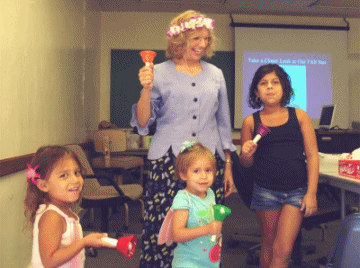
In Northern Arizona we had an awesome Pregnant Pause event at a Flagstaff hospital that raised awareness with 2,000 medical professionals. This was coordinated by Dr. Cindy Becket who is the co-chair of our state Task Force.
In Southern Arizona we had an all-day event with a focus on Pampering the Parents. We began at 9:09 with our traditional bell ringing (see photo), followed by a workshop. After a lasagna lunch, we had a special support group session for the parents, with chair massages for each weary parent.
And for the entire world, we share awareness videos on YouTube.com (channel name: BabyBornFree). In addition, readers may access hundreds of awareness ideas on the FASD Awareness Day Web site: www.fasday.com.
FASDay Events Sweep Canada
This year in Canada, FASDay events included a major conference, some candlelight vigils, “mocktail” competitions, breakfasts, luncheons, a play, and one brave woman with ARND speaking out for the first time to a group of university students. Many of these events brought media attention to FASD, building awareness in the community.
As FASDay crossed Canada, the first event was a free breakfast at the Moravian Church sponsored by the Labrador FASD Advisory Committee in remote Goose Bay. After a prayer and before a minute of silent reflection, the church bell tolled nine times at 9:09 under the clear Labrador sky, reported Elizabeth Dawson, nurse specialist with Labrador Health Secretariat. The event resulted in radio coverage. Other Labrador events were held in Nain and on the south coast of Labrador.
Then FASDay hit Montreal, Quebec, where the 2008 FACE (Fetal Alcohol Canadian Expertise) Research Roundtable was held, as organized each September 9 by the Motherisk Clinic at Toronto’s Hospital for Sick Children. Attended by 200 researchers, clinicians, front-line workers, parents and policy makers from Canada and around the world, it featured 20 speakers and poster presenters. The roundtable looked at research aimed at unraveling the mechanism of harm caused by fetal alcohol exposure; new tools for identifying children with FASD; early opportunities for successful intervention; and programs for women and children-at-risk that are now ready for implementation in communities throughout Canada. In addition, the new Canadian Foundation on Fetal Alcohol Research (CFFAR), an independent, non-profit foundation, announced its inaugural research grants.
To see the complete Webcast of the Roundtable, go to www.motherisk.org/fas.
In Ontario province, two cities – Sudbury and London – held mocktail competitions challenging local restaurants to create delicious nonalcoholic beverages. Mocktails are non-alcoholic party drinks perfect for designated drivers, pregnant women, children and others who choose not to drink alcohol. Laura Spero of London’s Southwest Ontario Aboriginal Health Centre (SOAHAC) reports that as well as the mocktail contest, SOAHAC held a candlelight vigil that included a performance by the Oneida Young Women’s Group and a small prayer ceremony. SOAHAC also created the edible FASKnot and distributed it at various community programs.
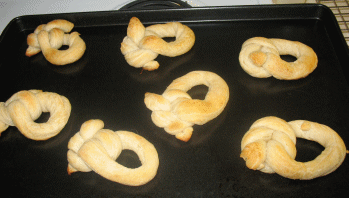
At 9 a.m. in Toronto, the Children’s Aid Society held an open-air presentation to staff and public on the steps of their new building in the downtown core of Toronto. Speakers included Executive Director David Rivard; Sharron Richards, manager of Community Development and Prevention Services; and FASDay co-founder Brian Philcox, who read the FASDay Proclamation from Mayor David Miller.
Barrie, an hour’s drive from Toronto, held its second annual FASD Awareness Day, hosted at city hall where community partners set up information tables. Adoptive mother Marlene Boos, director of Helping Hands for FASD, reported that Barrie’s local Member of Parliament attended; the mayor read an FASDay proclamation; and a member of the aboriginal community spoke and said a prayer. “We also had a moment of silence as the bell rang and talked about the birth of FASDay,” Boos added.
In the city of Hamilton, Ontario, the local Taskforce on FASD and the FASD Parent & Caregiver Support Group – a coalition of 30 agencies – organized a press conference on FASD sponsored by local provincial MPs Paul Miller and Andrea Horwath. In front of a crowd of supporters, organizers Nancy Hall and Deborah Borg issued a “Call for Action” to the Ontario Premier Dalton McGuinty to develop a support plan for people affected by FASD, similar to initiatives in British Columbia and Alberta. Their first goal: a much-needed diagnostic clinic within a year. Media attendance resulted in coverage from three local radio stations and several television items.
In the city of Thunder Bay, Ontario, the jam- packed annual FASDay breakfast featured a well-reviewed drama by local playwright Maureen Parkes – the tough but hopeful story about an alcoholic in recovery and mother of a child with FAS. As well, the Nishnawbe-Aski Nation sponsored a “Walk and Learn” session at Boulevard Lake.
Further west, The Pas, Manitoba, produced an innovative FASDay event: “The Great Northern Condom Giveaway” at local licensed establishments. Carie Macintosh reported that a small but ambitious group organized a civic proclamation, reading of invocation, greetings from officials, and a bell concordance at 9:09. These were followed by a FASD Awareness Walk; a fundraising BBQ; a student council BBQ at the local high school; plus information displays at the library, mall, high school, clinic and provincial building. The group also held a “Lunch and Learn Presentation” at the local hospital on September 10, and organized radio public service announcements for the rest of 2008.
Regina, the capital of Saskatchewan, held awareness activities throughout the month of September. On September 9, the community clinic ran an information table in the Fred Hill pedestrian mall. They held interactive information workshops on September 18; and ran a “crazy celebrity mocktail/cocktail evening” as an FASD awareness fundraiser on September 23.
In tiny Nipawin, Saskatchewan, 25 KidsFirst volunteers and staff members blanketed downtown businesses with information about the prevention of FASD – earning newspaper coverage as a result. KidsFirst is a government-funded program in Nipawin that manages parental outreach programs, supporting about 56 families in town. They have an office front in Central Park School. The package included some recipes for mocktails, to encourage people to assist pregnant women by not drinking in their presence.
In La Ronge, in northern Saskatchewan, facilitators offered stories, insight and practical advice on living and working with people living with FASD in a “Break and Learn” Telehealth session.
In the wild “Cariboo Country” of British Columbia, 34-year-old Sharon Woods of Williams Lake took a deep breath and talked to a class at Thompson Rivers University about her struggles as a child and adult with an undiagnosed fetal alcohol disorder. This was the first time she had ever spoken to a group, but it likely won’t be her last.
In the B.C. interior, Vernon’s FASD Awareness Walk took place at Polson Park, followed by lunch. In Abbotsford, closer to Vancouver, Michelle Roxborough is a teacher in a correctional facility’s rehabilitation unit which houses offenders with acquired brain injury or who are suspected or diagnosed with FASD. The week before FASDay, she prepared information on the FASKnots, as well as information on FASD for occupational therapists. “They made the knots with a small number of offenders (one of whom had a diagnosis). Staff was presented with an FASKnot and a brochure. Now I see staff wearing the knot on their lanyards and see it as a success,” said Roxborough.
David Gerry of Victoria’s Community Circle has discovered that, “by asking people to a luncheon of the Friday of the week of the 9th, we get double the attendance of holding any event on other days,” he said. This year they invited many “decision-makers” – two provincial cabinet members as guest speakers and as well invited mayors, police chiefs and politicians from all 13 municipalities in greater Victoria. The politicians were challenged to go without a drink for 9 months. “Only one council woman accepted the challenge,” writes Gerry. He adds, “we're hoping by inviting people who have some 'swing' that even by their making small changes in their attitudes we can move things ahead.”
In Canada’s north, coordinator Deb Evensen of the Fetal Alcohol Syndrome Society of Yukon (FASSY) organized a day-long observance for Whitehorse residents at the FASSY office, beginning with a “Moment of Reflection” at 9:09 and holding a free 9-hour barbecue. Like Victoria’s David Gerry, she has asked supporters to show support for those living with FASD, and stand in solidarity with those who are pregnant. “Choose to stay alcohol-free from September 9, 2008, until Mother’s Day, May 10, 2009.” It’s never too late for a nine-month pledge, she said, offering her email address at fascap@klondiker.com for more information.
The northernmost Canadian event took place in the mining community of Yellowknife, Northwest Territories, where the Yellowknife Association for Community Living held a Bell Concordance at 9:09 a.m.; a BreakFASD at the Salvation Army; and ran an information booth outside the post office.
Further south, also on the shore of Great Slave Lake, Northwest Territories, the isolated community of Lutsel K'e held its first FASD event. The community has a population of 350, most of aboriginal background, says organizer Gail Sajo of the South Slave Divisional Education Council. At a workshop for families and professionals, about 200 participants turned out, and were asked to put on noisy, scrunchy newspaper masks that demonstrated the difficulties “our” children experience in learning. While learning to tie the FASKnot, families and teachers began to understand why so many children in the area are “out-of-control.”
Iceberg thanks the many correspondents that added to our FASD Awareness Day coverage.
 Recipe Highlights from the Mocktail Events
Recipe Highlights from the Mocktail Events
SOAHAC’s Mama Minto (London, ON)
3 mint leaves
1 teaspoon raw sugar
1 ounce fresh lime juice
½ ounce simple syrup
ice
4 ounces chilled ginger ale
In a glass, muddle/crush the mint, sugar, lime juice and simple syrup
Add ice. Top with the ginger ale. Enjoy!
Survivor (Nipawin, SK)
1 sliced banana
60 ml orange juice
60 ml half and half
30 ml grenadine
crushed ice
Blend all ingredients at high speed and pour.
Knot to be Silent
In January of 191999, while digging out from a Toronto snowstorm, my husband Brian Philcox and I realized that September 9, 1999 (9-9-99), would present an opportunity to inform the world that during the nine months of pregnancy, alcohol is dangerous to the baby.
Within 24 hours, Teresa Kellerman of Tucson, Arizona, had contributed her creativity and Internet genius by encouraging volunteers in seven countries and 11 time zones to participate in the first International FAS Awareness Day. Because every ribbon colour had been taken by other causes, Brian and I spent several hours developing the FASKnot symbol in honor of the first book about Fetal Alcohol Syndrome, Michael Dorris’s "The Broken Cord."
Nine years later, the events continue and now we challenge FASD advocates to take advantage of 2009 to build awareness all year long, particularly on 09-09-09.
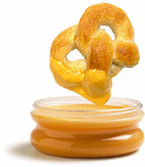
The Edible FASD Knot was created by the Southwest Ontario Aboriginal Health Centre (SOAHAC)
Edible FASD Knot
Ingredients:
- One 11-ounce package (8) refrigerated breadsticks
- 2 tablespoons butter or margarine, melted
- 2 tablespoons sugar (optional)
- 1/4 teaspoon ground cinnamon (optional)
- Cheese dip or prepared mustard (optional)
Instructions:
- Gently pull or roll each breadstick on a clean surface to make a 20 inch rope.
- Shape each rope into a FASD knot by creating a reef knot (see photos).
- If desired, stir together the sugar and cinnamon; sprinkle over pretzels.
- Bake in a 350 degree F oven for 15 to 18 minutes or until knots are golden.
- Cool on a wire rack.
- If desired, serve with a variety of dips.
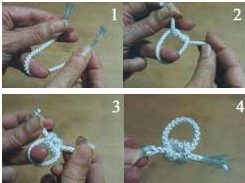
www.FASiceberg.org
iceberg_fas@yahoo.com
FASIS - Iceberg
P.O. Box 95597
Seattle, WA 698145-2597
